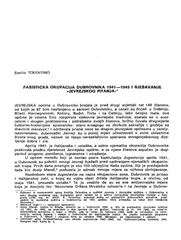Приказ основних података о документу
Fašistička okupacija Dubrovnika 1941-1945 i rješavanje "Jevrejskog pitanja"
The fascist occupation of Dubrovnik 1941-1945 and the solving of the “Jewish question”
| dc.creator | Tolentino, Emilio | |
| dc.date.accessioned | 2019-11-23T22:23:26Z | |
| dc.date.available | 2019-11-23T22:23:26Z | |
| dc.date.issued | 1971 | |
| dc.identifier.issn | 0353-0612 | |
| dc.identifier.uri | https://www.jevrejskadigitalnabiblioteka.rs/handle/123456789/88 | |
| dc.description.abstract | Jevrejska općina u Dubrovniku brojala je pred drugi svjetski rat 148 članova, od kojih je 87 bilo nastanjeno u samom Dubrovniku, a ostali su živjeli u Trebinju, Bileći, Hercegnovom, Kotoru, Budvi, Tivtu i na Cetinju. lako brojno mala, ova općina je veoma živo njegovala vjekovne jevrejske tradicije, starala se o socijalnim i drugim problemima i potrebama svojih članova, brižno čuvala dragocjene kulturno-historijske spomenike: staru sinagogu sa zbirkom sakralija i groblje sa drevnim macevot (nadgrobni spomenici) i održavala prisne veze sa drugim jevrejskm općinama u zemlji. Istovremeno, dubrovački Jevreji su u punoj mjeri učestvovali u svim oblastima života svog grada, vezani za njega neraskidljivim sponama mnogovjekovnog dijeIjenja dobra i zla. Aprila 1941. je italijanska i ustaška, a zatim njemačka okupacija Dubrovnika prekinula plodnu djelatnost Jevrejske općine, a za njene članove započeo je dugi period progona, poniženja, izgnanstva i stradanja. U općem metežu koji je nastao posle kapitulacije Jugoslavije aprila 1941, u Dubrovnik su pohrlili mnogi Jevreji bježeći pred nadiranjem njemačkih okupacionih trupa. Prvih dana pristiglo je oko 700 izbjeglica. Naša općina, čiji je predsjednik tada bio Josip Mandl, poduzela je odmah mnoge mjere za njihovo zbrinjavanje. Razdiobom stare Jugoslavije na razne okupacione zone, Dubrovnik je pripao I italijanskoj zoni, u kojoj su vojnu vlast držale italijanske trupe, a civilnu, od maja 1941, preuzele ustaše. To je značilo da su se sve antijevrejske mjere koje je donijela tzv. Nezavisna Država Hrvatska odnosile i na Jevreje u Dubrovniku... | sr |
| dc.description.abstract | The present text contains the fragments of the memoirs written by Emilio Tolentino, president of the Jewish community at Dubrovnik, concerning the destiny of the Jews of Dubrovnik during the World War II. The complete writings are preserved in the Archives of the Jewish Historical Museum in Belgrade. The Jewish community of Dubrovnik numbered, on the eve of the World War II. 148 members only, 87 of whom reside in Dubrovnik itself and the rest from the surrounding smaller localities, but in the course of the first two years of the Nazi occupation, 1941-1942, there arrived in Dubrovnik about 1,600 Jewish emigrants from those regions of Yugoslavia which were under the sway of German troops and Ustaši and where the Jews were being murdered in masses. Gestapo insisted, through the Italian government and with Mustsjlini's consent, that in the regions occupied by the Italian army, all anti-Jewish measures should be carried out like in the rest of Europe under German occupation and finally that all the Jews should be extradited to the Germans in order to be deported to German concentration camps. During the first months of occupation, when the civil authority was held by Ustaši, to the Jews were actually applied all measures like on all occupied territories: they had to wear the yellow ribbon, their property was confiscated, they were prohibited to circulate freely through the town, many Jews were arrested and some of them deported to the concentration camps. E. Tolentino gives a description of how the Germans, in July 1941, aided by Ustaši, confiscated the archives of the Jewish community, together with the most important “Pinakes” dating from the 17th century. They could not find the Torahs and other valuable objects from the synagogue, because they were hidden by the Tolentino family at the very beginning of the occupation and these valuables are now again to be found in the old synagogue from the 15th century. When the Italian military command assumed, in September 1941, also the civil administration, the arrests and deportations stopped, but the Jews lived in great distress. The greatest care of the Jewish community was how to lodge and entertain a large number of refugees, as well as how to collect aid for sending victuals and clothes to concentration camps on the territory of the “Independent State of Croatia" 'in which the Germans and Ustaš’i had already imprisoned tens of thousands of Jews. When, in November 1942, the Gestapo exerted a constantly increasing pressure to obtain the extradition of all Jews, the Command of the Vlth Italian army corps managed to elude this by forming itself three concentration camps for those Jews who were at that time in Dubrovnik. These camps were situated in Gruž, Kupari and on the island of Lopud. When the Gestapo was not satisfied with this measure, the Italian command transported the Jews from its occupation zones to the new concentration camp on the island of Rab, where they remained until the Italian capitulation, on September 9, 1943. Several hundreds of young men and girls joined the armed struggle against the German invaders. The older people took part in various activities of the people's authority on the liberated partisan territory. Of 87 autochthonous Jews of Dubrovnik - not including the refugees who sojourned temporarily in the town - 24 took part in the struggle for people's liberation and 6 of them fell in battle; 27 individuals lost their lives as victims of the fascism. | en |
| dc.language.iso | sr | sr |
| dc.rights | openAccess | sr |
| dc.rights.uri | https://creativecommons.org/licenses/by-nc-nd/4.0/ | |
| dc.source | Zbornik 1 : Studije i građa o Jevrejima Dubrovnika, Jevrejski istorijski muzej - Beograd = Jewish studies 1 : Studies and documents about Jews in Dubrovnik, Jewish historical museum - Belgrade | sr |
| dc.subject | Jevreji Dubrovnika (1941-1945) | sr |
| dc.subject | Jews of Dubrovnik (1941-1945) | sr |
| dc.subject | Emilio Tolentino - memoari | sr |
| dc.subject | Emilio Tolentino's memoirs | sr |
| dc.title | Fašistička okupacija Dubrovnika 1941-1945 i rješavanje "Jevrejskog pitanja" | sr |
| dc.title | The fascist occupation of Dubrovnik 1941-1945 and the solving of the “Jewish question” | en |
| dc.type | article | sr |
| dc.rights.license | BY-NC-ND | sr |
| dcterms.abstract | Толентино, Емилио; Фашистичка окупација Дубровника 1941-1945 и рјешавање "Јеврејског питања"; Фашистичка окупација Дубровника 1941-1945 и рјешавање "Јеврејског питања"; | |
| dcterms.abstract | Толентино, Емилио; Фашистичка окупација Дубровника 1941-1945 и рјешавање "Јеврејског питања"; Фашистичка окупација Дубровника 1941-1945 и рјешавање "Јеврејског питања"; | |
| dc.rights.holder | Savez jevrejskih opština Srbije = Federation of Jewish Communities of Serbia | sr |
| dc.identifier.fulltext | http://jevrejskadigitalnabiblioteka.rs/bitstream/id/135/JIM0110EMILIOTOLENTINOFASISTICKAOKUPACIJADUBROVNIKA.pdf | |
| dc.type.version | publishedVersion | sr |
| dc.citation.spage | 201 | |
| dc.citation.epage | 210 | |
| dc.citation.issue | 1 | |
| dc.description.other | Odlomci iz memoarskih spisa Emilija Tolentina o sudbini Jevreja i Jevrejske opštine u Dubrovniku u toku Drugog svetskog rata. Kompletni spisi nalaze se u arhivu Jevrejskog Istorijskog muzeja u Beogradu. Emilio Tolentino je potomak jedne od najstarijih dubrovačkih porodica. Bio je predsednik Jevrejske opštine u Dubrovniku. | sr |
| dc.identifier.rcub | https://hdl.handle.net/21.15107/rcub_jdb_88 |
Документи
Овај документ се појављује у следећим колекцијама
-
Gradovi i mesta - istorija [Cities and Places - history]
-
Zbornik JIM 01 [Jewish Studies JHM 01]
Studije i građa o Jevrejima Dubrovnika / Studies and Documents about Jews in Dubrovnik -
Holokaust u Jugoslaviji [Holocaust in Yugoslavia]

